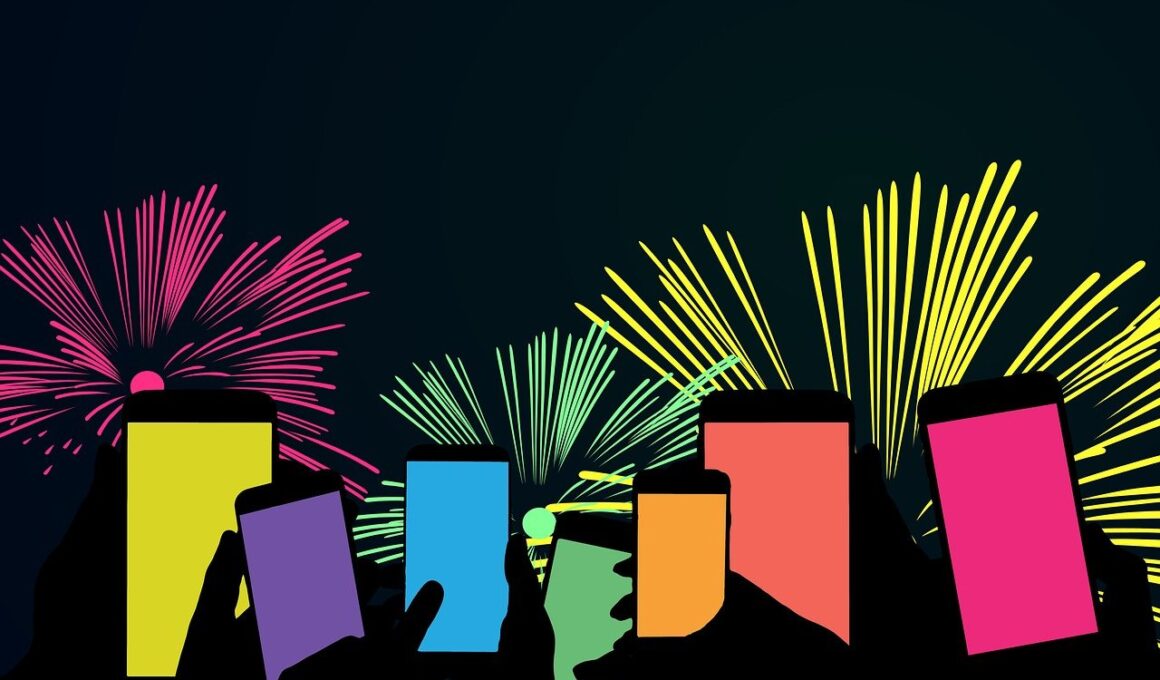The Future of Gamification in Event Social Media Marketing
Gamification is revolutionizing event marketing, especially within the realm of social media strategies. This approach entails integrating game-like elements into social platforms to foster engagement and interaction among participants. Organizers can introduce competitions, challenges, and rewards via social media to motivate attendees to actively participate. For instance, by encouraging users to share content, participate in polls, or complete designated tasks, companies can dramatically increase audience interaction. Additionally, the application of points, badges, and leaderboards cultivates a sense of achievement that resonates well with today’s digitally savvy audience. Future event marketing strategies are likely to build on these gamified experiences, boosting participation rates dramatically. Event planners are tasked with finding innovative ways to implement these strategies effectively. It’s crucial to ensure that the gamification elements align with overall event goals, creating a seamless experience for participants. As technology continues to evolve, the tools available for gamification will also advance, resulting in more sophisticated methods of engagement. Additionally, extensive analytics will enable planners to generate deeper insights into participant behavior, facilitating the optimization of future events.
One practical example of gamification in social media is through trivia games centered around the event theme. Attendees can engage in these trivia sessions, and earn points for accurate answers, fostering a collective learning experience. Furthermore, consider incorporating interactive quizzes related to the event’s subject matter. These quizzes not only serve to educate participants but also reinforce the event’s key messages. It is essential to promote these gamified components early and often across social media channels. Launching these activities prior to the event can generate excitement, thereby increasing attendance and overall engagement. Shareable content that invites friends and colleagues enhances visibility, attracting more participants. Additionally, live leaderboards on social media can provoke healthy competition among attendees, encouraging them to increase their engagement and social media presence even more. Offering tangible rewards such as discounts for future events or exclusive merchandise enhances participation. Moreover, campaigns can harness user-generated content where participants showcase their achievements, reinforcing community spirit. Ultimately, incorporating these strategies stands to amplify the social media presence of events considerably, enticing more individuals to engage and attend.
Enhancing Attendee Experience
The integration of gamification in social media marketing significantly enhances the overall attendee experience. Traditional marketing methods often encounter challenges engaging audiences on multiple levels. However, with gamified strategies, the relationship between event organizers and participants shifts to a more interactive and personal level. Attendees feel more connected and invested as they actively contribute to the event. Personalized incentives can be offered as rewards for engagement, such as exclusive access to speakers or VIP areas. This encourages attendees to network, share their experiences, and ultimately forge meaningful connections. Moreover, social media platforms provide various tools for organizers to foster a sense of community before, during, and after events. By creating an online space for attendees to interact, share experiences, and provide feedback, planners also benefit from increased event visibility. The sense of belonging induced by gamification can empower participants to return to future events, perpetuating an event’s longevity. Overall, these strategies can ultimately craft memorable experiences that attendees will cherish, leading to lasting loyalty and engagement. Events that prioritize attendee experience effectively solidify their reputation within the industry.
Incorporating virtual elements is another significant factor in the future of gamification. The rise of augmented reality (AR) and virtual reality (VR) technologies opens further avenues for engaging attendees socially. These technologies can be synergistically combined with social media gamification strategies to offer immersive experiences for participants. For example, attendees could engage in virtual scavenger hunts within a social media platform, where they unlock different content pieces or exclusive rewards by participating in various activities. This not only stimulates interest but also pushes attendees to share their experiences on social media, organically promoting the event. As technology approaches virtual environments, the potential for gamified social interactions will likely expand to levels previously unimagined. Additionally, leveraging location-based services on smartphones can provide participants with location-specific challenges and quests, enhancing their overall experience. Such implementations will necessitate a well-thought-out integration strategy to ensure seamless interactions. Overall, the future landscape of gamification within social media for events will be marked by innovation and creativity, paving the way for unforgettable experiences that captivate attendees.
Building Brand Loyalty and Recognition
Implementing gamification strategies not only boosts immediate engagement but also strengthens long-term brand loyalty. Engaging social media experiences are invaluable in shaping how participants perceive an event’s brand. When attendees enjoy interactive and fun experiences, they are likely to associate positive emotions with the brand behind the event. The emotions they experience during gamified events can create lasting impressions, often leading to repeated attendance in the future. Furthermore, event organizers must focus on fostering this sense of brand loyalty through continued interaction after the event concludes. Providing attendees with opportunities to share their experiences on social media and rewarding them for doing so can help maintain engagement. Offering follow-up challenges or competitions through social platforms keeps participants involved and connected to the brand. Overall, when executed effectively, these gamification strategies have the potential to forge lifelong relationships between brands and their audiences. An event that resonates strongly with attendees not only builds brand loyalty but also encourages them to become brand ambassadors who advocate and promote the event across their networks.
Analytics play a crucial role in refining gamification strategies in social media for events. The ability to track engagement metrics and participant behavior provides valuable insights that can enhance future initiatives. This data assists organizers in determining which gamified elements resonate most positively among attendees. Utilizing analytics tools helps to identify trends in participation, preferences, and interactions, allowing for more effective targeting in future marketing campaigns. Furthermore, feedback gathered through gamification can offer organizers insights into what worked well and areas for improvement. Attendees appreciate brands that listen and adapt, and continuous improvement fosters a positive relationship. Therefore, event organizers should not overlook the importance of post-event evaluations that allow for reflection and strategic planning for upcoming events. Looking ahead, the potential for personalized experiences based on data will increase, offering even more engagement opportunities. The future of gamification lies in leveraging data to deliver tailored experiences that resonate with specific attendee segments. By understanding these preferences and behaviors, organizers can not only create memorable events but also ensure that their social media strategies remain relevant and effective.
Conclusion: The Path Forward
As we navigate the future of social media for events, the role of gamification will undoubtedly become even more prominent. Event organizers must take the time to develop innovative strategies that harness the power of competition, rewards, and interactive experiences. While traditional marketing approaches have their merits, they may not capture the attention and engagement needed in today’s social media-driven world. Gamification allows brands to meet audiences where they are, by creating engaging and shareable content that transcends conventional promotions. Moreover, the continuous advancement of technology will enable more sophisticated gamified experiences that challenge conventional norms. With tools such as AI and machine learning, event organizers can tailor experiences down to the individual attendee, creating personalized journeys that captivate. Ultimately, embracing gamification in social media marketing for events offers unparalleled potential for engagement, brand loyalty, and memorable experiences. By prioritizing these strategies, event organizers can set themselves apart in a competitive landscape, ensuring their events remain relevant and successful for years to come.
In summary, the intersection of gamification, social media, and event marketing presents unique opportunities for innovative engagement strategies. These methods, when executed effectively, will not only enhance the experience of attendees but also drive ongoing dialogue and connections beyond individual events. The future holds immense potential for exploring gamification applied within diverse event contexts, shaping the way audiences interact with brands and their peers. Engaging participants through gamified experiences serves to meet rising consumer expectations for more memorable and enriching interactions during events. To achieve success in this evolving space, organizers must be agile in their approach, adapting to new technologies and audience preferences. Fostering community through gamification has the power to transform passive attendees into active participants who feel a connection to events and brands alike. These strategies will play a pivotal role in setting trends and standards for event marketing. Finally, it’s essential to remain abreast of emerging trends within the realm of gamification and social media as they continue to blend, giving rise to fresh ideas and directions for future events.


